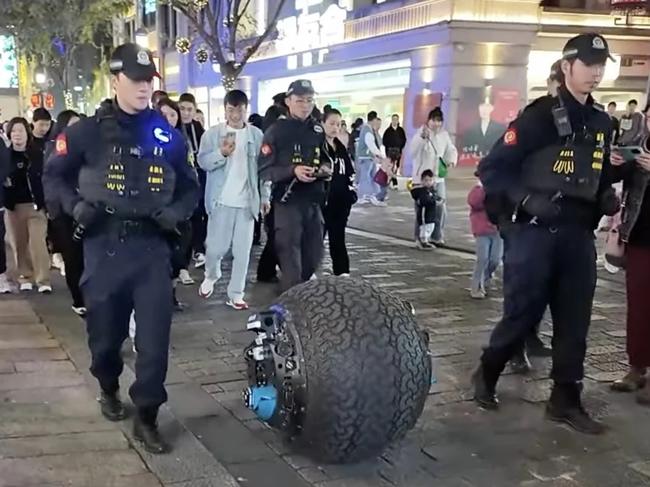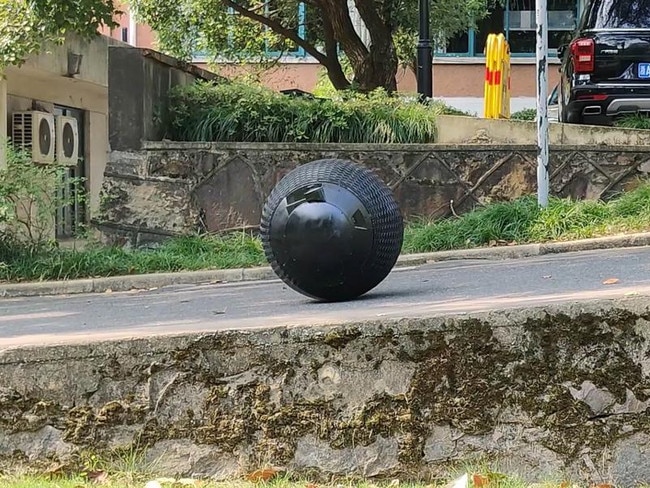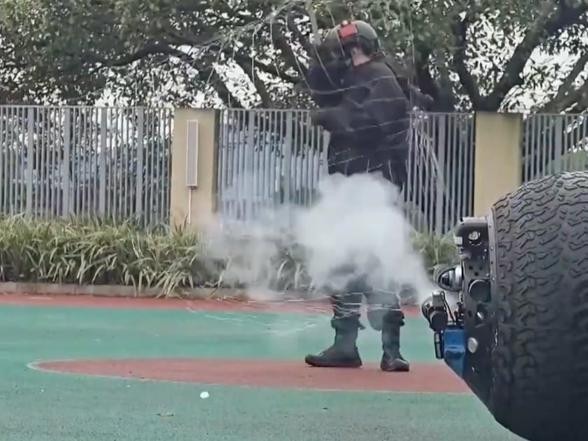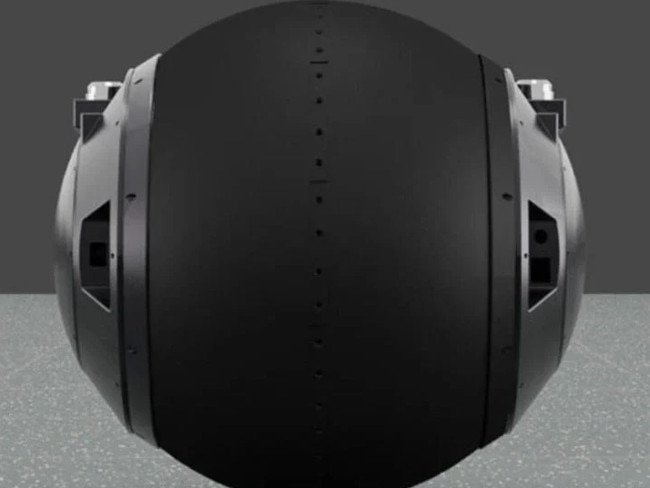‘Sinister’ robot that’s ‘replacing humans’ on the beat in China
A creepy “robocop” has been released in China, capable of chasing criminals on land or water – and striking with a range of weapons.
A practical policing solution? Or science fiction? Police in China have put “Rotunbot Cop” on display. But not everything is as it appears.
It bowls over robot dogs.
It wobbles down alleys in hot pursuit.
It swims after suspects attempting to evade arrest.
And baseball bat attacks bounce off.
The self-balancing robotic sphere has hit Wenzhou, Zhejiang province’s shopping strip on China’s southeast coast.
Rotunbot RT-G is set to become a cop’s best friend on the beat.
“Narrow terrain, extreme weather, dangerous work environments, violent conflicts and wars, all pose huge threats to human life and activities,” a promotional video from its manufacturer proclaims.
“Thus an amphibious, intelligent robot emerged to replace humans in these style environments.”
The gyro-stabilised 125kg ball can hit a top speed of 30km/h from a standing start in 2.5 seconds.
It has cameras to give it a near 360-degree view.
Ultrasonic sensors give it a sense of distance and trajectory.

And while it isn’t armed, its rotund body conceals a variety of nonlethal weapons such as nets, capsicum spray and speakers.
“This robot can cope with dangers such as falling or being beaten,” its creator Wang You told the South China Morning Post.
“(It) can perform tactical actions such as enemy identification, tracking, and capture after modular modification.”
Its manufacturers boast it’s robust enough to bounce off a waist-high ledge. And its top speed is just enough to catch an average crook – though not an Olympic sprinter.
Water is no obstacle. But stairs – and going back up whatever ledge it bounces down from – remains insurmountable.
It doesn’t come equipped with knees.
Or opposable thumbs.
So once any less than enterprising escapee is cornered … Rotunbot RT-G must call for backup.
But it certainly looks sinister enough.

“In a viral clip that could come straight from a sci-fi film, the spherical robot is decked out with cameras and flashing lights, and tilts and rolls around without tipping over,” pronounces Communist Party-controlled media outlet, The South China Morning Times.
But its creator is clearly not a fan of the Star Wars franchise.
Wang You, associate professor from the College of Control Science and Engineering, Zhejiang University, says he was inspired in 2017 by work done by a Swedish research team at the University of Uppsala.
But Star Wars’ iconic BB8 spherical droid – a remote-controlled animatronic stage prop using the same self-stabilising technology – began its movie career in 2015 with the release of Episode VII, The Force Awakens.

Kids have been playing with motorised toy versions ever since.
And 50 years earlier, in 1967, British drama The Prisoner introduced the idea of a rolling sentient “bubble” sentry. Called “Rovers”, these pursued prisoner Number 6 across the island’s mountainous terrain, idyllic streetscapes, beaches – and open ocean.
Likewise, early impressions of the Logon (Hangzhou) Technology Co Rotunbot RT-G are of a plot device.

The vehicle has not been demonstrated to be autonomous, as claimed. Instead, it is shown being remote-controlled by police officers walking nearby with laptops and handheld devices.
But the mechanical ball – complete with red and blue flashing lights – is a master of the performing arts.

“If you win the fight, you’ll end up in jail,” a voice transmitted by the robot proclaims in a simulation video.
“If you lose the fight, you’ll end up in hospital.”
It then fired off a quick text message to summon human meatbags to do the dirty work of an actual arrest.
Despite its limitations, the SCMP reports the Chinese Ministry of Public Security and the Ministry of Industry and Information Technology are determined to eventually roll out a real robocop.

They have issued a public tender notice seeking “typical application scenarios for robots in policing that should closely revolve around practical needs, such as security patrols, service management, border defence and investigation and evidence collection”.
Chinese online news service Global Times reports the Rotunbot costs about $A66,000 a copy. That price point pitches it against the average $69,964 per year (or $35.88 per hour) cost to put a person in a blue uniform.
But, for now, the knees and thumbs of those officers could probably be put to more practical policing effect than operating a prop cop.
“With constant improvement and modifications and its decreased costs with expanded production scale, Wang expects that the application prospect of the spherical robot will expand to home appliance or toys,” the Global Times predicts.
BB8 may have something to say about that.
Jamie Seidel is a freelance writer | @jamieseidel.bsky.social
More Coverage
Originally published as ‘Sinister’ robot that’s ‘replacing humans’ on the beat in China





